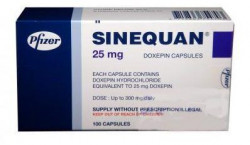Sinequan (doxepin) Coupons, Discounts & Cost
Sinequan (doxepin) comes from the group of tricyclic antidepressants. One way to save money on the Sinequan retail cost regardless of income and insurance status is to use Sinequan coupons or discount cards from RXCoupons. Use this Doxepin coupon at this online pharmacy and receive up to 75% off the sale price.
Sinequan pharmacologic effect
Sinequan (doxepin) comes from the group of tricyclic antidepressants. It is known as antidepressant with anxiolytic, analgesic, moderate antiulcer, antipruritic effect. Doxepin has sedative effect when used in moderate doses. However, with excess dosage, this drug can cause severe rhythm and conduction disorders (cardiac arrest in extreme cases).
Long-term therapy helps normalize adrenergic and serotonergic transmission in depressive states. Sinequan improves mood, reduces anxiety, panic and depressive manifestations. It is effective in the treatment of neurotic disorders, as well as bulimic disorders accompanied by depression.
Sinequan indications for use
- Depression (in manic-depressive psychosis and cognitive impairment), anxiety associated with neuroses, psychoses, chronic alcoholism; - Panic disorder; - Neurotic reactions with persistent pronounced sleep disorders; - Premedication before certain procedures that do not require general anesthesia (for example, before endoscopic examinations); - Complex therapy of peptic ulcer, premenstrual syndrome, various chronic pain syndromes (especially in neuropathies); - Prevention of migraine, skin itching.
How should I use this drug?
Sinequan is taken orally immediately after meals (the drug irritates the gastric mucosa), with a small amount of water, up to 2 times a day. The initial daily dose for moderate clinical manifestations is 75 mg. You can gradually increase the dose up to 150 or 300 mg per day (in case of severe symptoms of depression).
As for minimal depressive and anxiety disorders, the daily dose may be reduced up to 25-50 mg. The duration of the course is 2-3 weeks with a gradual reduction of the dose.
As for premedication before endoscopic interventions and other studies, the drug is administered intramuscularly once in a dosage of 25-50 mg, depending on the weight of the patient.
What should I know about common side effects?
Side effects may include: visual impairment, high intraocular pressure, bipolar violation, increased heart rate, arrhythmias, dryness of oral mucosa, stomatitis, dyspepsia, constipation, urinary retention, dry skin. In addition, the drug can worsen depressive symptoms and psychotic disorders. The therapy can lead to hallucinations, delirious states, paresthesia, myasthenia gravis, epileptic episodes.
Disorders of hemopoiesis are also possible: eosinophilia, cytopenia, hemorrhagic vasculitis.
Allergic reactions: urticaria, angioedema, edema.
Side effects in case of overdose: coma, ataxia, hallucinations, psychomotor agitation, epileptic seizures, rhythm and conduction disorders, respiratory depression, dyspnea, indigestion, anuria. Hospitalization is necessary if you suspect an overdose.
What should I know about Sinequan main contraindications?
Absolute contraindications: hypersensitivity, intoxication of various genesis, angle-closure glaucoma, cardiac arrhythmias, children up to 12 years of age, acute phase of myocardial infarction.
Relative contraindications: chronic exogenous intoxications, bronchial asthma, manic-depressive psychosis, pregnancy (especially I trimester), breastfeeding (the drug penetrates into breast milk and can cause certain disorders in children), severe diseases of the cardiovascular system, cerebrovascular disease, impairment of motor function of the digestive tract, increased intraocular pressure, liver or kidney failure, prostatic hyperplasia, schizophrenia, epilepsy, old age.
Doxepin is not prescribed during pregnancy (especially I trimester) and breastfeeding.
What should I know about Sinequan interactions?
Use doxepin with extreme caution with drugs depressing the central nervous system, as well as with anticholinergics, anticoagulants, thyroid hormones. Doxepin reduces the effectiveness of phenytoin and alpha-blockers. Cimetidine increases the risk of toxic effects.
Barbiturates, oral contraceptives, nicotine reduce the concentration of doxepin (you may need to use higher doses). Fluoxetine and fluvoxamine increase the concentration of doxepin.
Sinequan therapy is incompatible with MAO inhibitors. Antipsychotics increase the risk of violations of thermoregulation.

